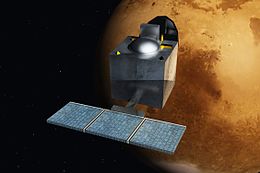Long time, no blog. The last few months have been busy in abnormal ways, so I've been thrown off my routine. I'm finally catching up on life, so it's time to get back into the blogging game!
 |
| Celebration as MAVEN moves into orbit. Credit: Lockheed Martin |
During the time I've been slacking on my blog, there were two things in the universe that were notably
not slacking off--NASA's Mars Atmosphere and Volatile Evolution craft (
MAVEN) and India's Mars Orbiter Mission (
MOM).
After 10 months of space travel, MAVEN entered into orbit around Mars one week ago. MOM had traveled for a similar amount of time, and entered into orbit just days later. Both of these spacecrafts have made huge strides for science and space travel.
 |
| Artist's conception of MOM. |
MOM is India's first interplanetary mission, and was launched to simultaneously test out their space travel technology and also set into orbit another piece of scientific equipment around Mars. MAVEN, on the other hand, was launched by NASA with one particular burning question in mind:
what happened to Mars' atmosphere?
Mars is incredibly similar to Earth, with one glaring difference being its lack of reasonable atmosphere. Once, however, Mars
had a thicker atmosphere. NASA wants to know what changed, and could it ever happen to us. MAVEN is designed with a set of specialized instruments to try and answer this mystery.
 |
| Artist's conception of Siding Spring passing by Mars. NASA. |
Both of these spacecraft have reached Mars just before an incredibly rare event is set to take place. The
Siding Spring comet is due to fly past Mars on October 19th, peppering the surface of the planet with meteorites and flying closer to Mars than the Moon is to Earth. NASA has worked tirelessly to ensure all the orbiters and rovers will safely make it through this major event, and presuming all goes well, every piece of equipment NASA has on and around Mars will get a chance to study this comet as it flies by. This is an incredible opportunity to not only learn more about comets, but learn what happens to a planet when one gets this close!
Basically, Mars is taking one for the team, and we're lucky enough to have had prep time to move our equipment to safe locations.
Expect a more usual blog schedule to resume as the fall goes on, and updates on the entire comet situation as it draws closer!



No comments:
Post a Comment